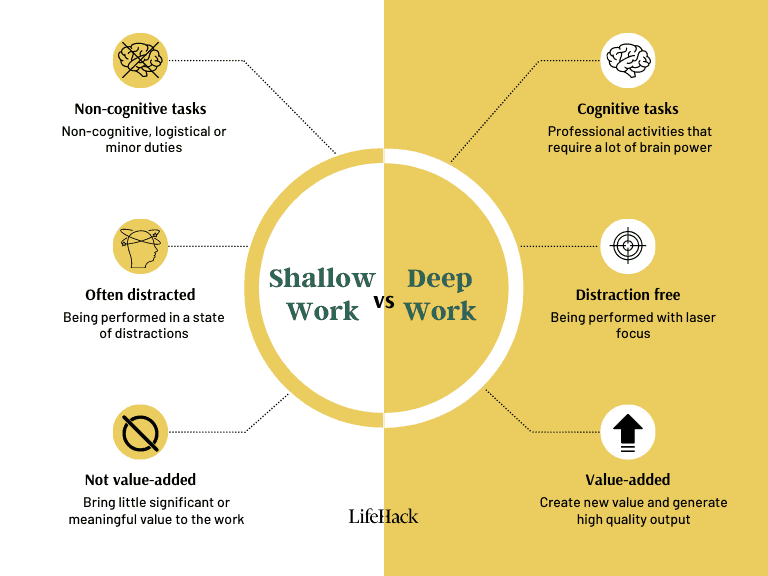Deep Work: Rules for Focused Success in a Distracted World
- Published on
- • 4 mins read•––– views

In Deep Work, Cal Newport argues that the ability to focus deeply is becoming increasingly rare and valuable. In a world full of distractions, the book provides a guide to cultivating deep focus and achieving greater success by working deeply and efficiently.
Key Principles from Deep Work:
1. Deep Work vs. Shallow Work
Newport distinguishes between "deep work," which is focused and undistracted, and "shallow work," which is non-cognitively demanding and often performed while distracted. He argues that deep work is both more fulfilling and productive, leading to higher-quality results.
2. Embrace Boredom
Newport suggests that we need to practice being bored. In a world where we are constantly bombarded with stimuli, we have lost the ability to focus without distraction. By scheduling time for boredom and resisting the urge to constantly check our devices, we can retrain our brains for sustained concentration.
3. Quit Social Media
Newport advocates for quitting or reducing the use of social media. He argues that while social media can provide short-term gratification, it ultimately detracts from our ability to focus and perform deep work. By cutting back on time spent online, we can reclaim valuable mental energy for more meaningful tasks.
4. Work Deeply
To perform deep work, Newport provides strategies to create an environment conducive to concentration. This includes setting aside specific time blocks for focused work, eliminating distractions, and creating routines that encourage deep focus.
5. The 4DX Framework
Newport introduces the "4DX" framework for achieving deep work:
- Focus on the Wildly Important: Identify your most crucial goals and dedicate time to them.
- Act on the Lead Measures: Prioritize tasks that drive progress toward your goals.
- Keep a Compelling Scoreboard: Track your progress regularly to stay motivated.
- Create a Cadence of Accountability: Build a system of accountability to maintain consistency in your work.
Key Takeaways:
- Deep work is valuable: In a world of constant distractions, the ability to focus deeply on important tasks is increasingly rare and valuable.
- Practice boredom: We need to retrain our minds to resist constant stimulation and embrace moments of boredom to improve our ability to focus.
- Eliminate distractions: Cutting back on social media and other distractions can help us reclaim the mental energy needed for deep work.
- Create deep work routines: Setting aside specific time blocks for focused work and developing systems to track progress can help improve productivity and performance.
Actions I've Taken:
- Creating time for deep work: I’ve started setting specific time blocks for focused work, free from distractions like social media or email.
- Limiting social media use: I’ve reduced my time spent on social media, recognizing its negative impact on my ability to focus and work deeply.
Why This Book Matters:
Deep Work is essential for anyone looking to increase their productivity and focus in an increasingly distracted world. Newport’s strategies help readers develop the discipline to produce high-quality work and achieve their goals, while also offering a meaningful, fulfilling approach to personal and professional success.
Personal Reflection:
Since reading Deep Work, I’ve been more intentional about my focus and the way I structure my workday. I’ve noticed that dedicating specific time slots for deep work has significantly improved my productivity and the quality of my output. Additionally, reducing distractions, like social media, has given me more mental clarity, allowing me to focus on what truly matters.